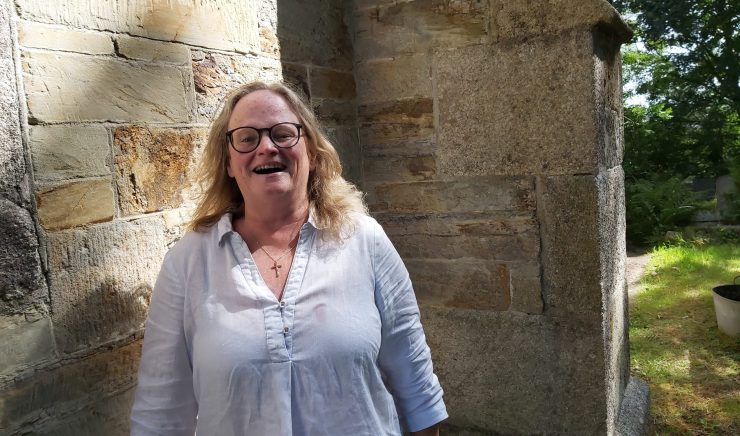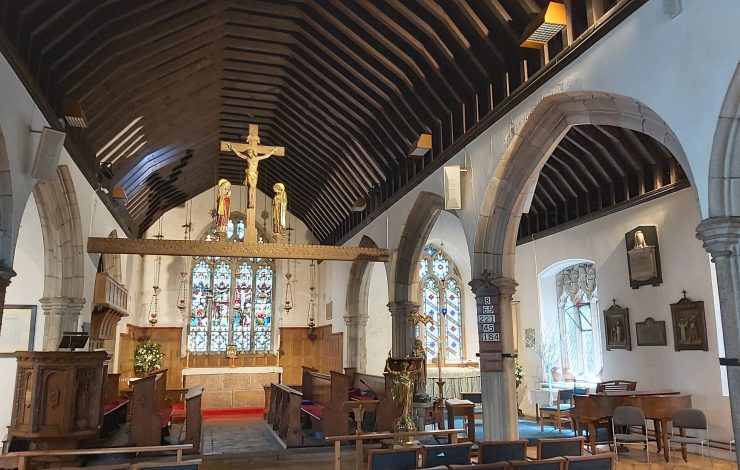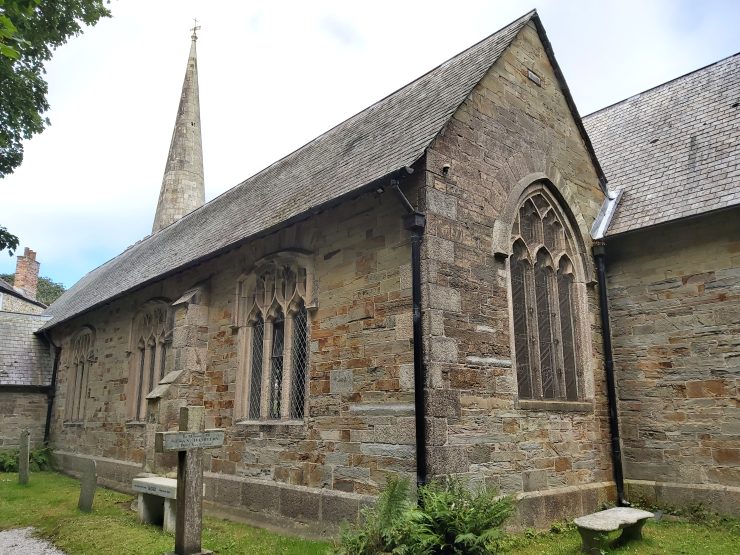Serving St Agnes
In the third in our occasional series of articles focusing on our lay leaders, we talk with Charlotte Irwin, churchwarden and local worship leader in St Agnes.
Charlotte was born in Derby. She and her husband moved to Cornwall with their three children twenty-one years ago. They’d bought the old vicarage in St Agnes.
“We heard that no one wanted the old vicarage sold. We were the wicked people from up country who’d moved in,” she recalls. “But they’ve since said they were glad we came.”
Charlotte and her husband have more than made it up to the parish in the intervening years.
“I didn’t do so much in church when we first arrived,” she says. “I’ve never not gone to church. But I’ve not always been so actively involved.”
She’d started by helping out at the Sunday School. Her contribution has grown significantly since then.
“I can thank the last vicar for that,” she laughs. “He asked me to be treasurer for the Parochial Church Council. And once you’re in they’ve got you!”
Around five years ago, Charlotte and her husband Steve took the course run by the Diocese in foundations in Christian ministry. They now lead a service at the church in St Agnes once a month. They have a set liturgy planned out few years ago in collaboration with the vicar in charge of their benefice, the Reverend Canon Anne Brown.
Revd Anne is approaching her retirement and Charlotte says she is hugely grateful for the support and encouragement she’s given as their oversight minister.
She contrasts their current situation with the previous occasion on which the Benefice had gone through a period of transition between incumbent priests.
“The last time, we went into a bit of a tailspin,” she explains. “But now we feel we’ll be alright. That’s thanks to her style of ministry. She’s really empowered our PCC. It’s now one that owns the decisions it makes. So we feel much less worried about the period of vacancy.”
Anne’s approach has attracted not only new membership to the church but also active participation in church activities.
“Her style is very different from your traditional priest,” Charlotte explains. “It’s very much that we’re in this together. She’ll guide us and roll up her sleeves for us.”
Where a more old-fashioned minister might find it difficult to endorse initiatives that they wouldn’t have the time to run themselves, Anne has been keen to let her parishioners take the lead with their own ideas.
“We all discuss things properly and make the decisions together,” Charlotte says. “And so, we’ve had people come and step up and be active participants – people that never were before.”
Charlotte suggests that this way of doing things has helped to make the church community work together rather like a family.
“When you’re have a meal with your family, you don’t just sit and wait to be served,” she says. “You all muck in. Everything’s better when everyone pulls together.”
It’s an approach which has fostered collaborative and innovative approaches.
Suffer little children
Charlotte says that the congregation at St Agnes have been supportive not only of their lay-led services but also of the new ideas which she and her husband have introduced to involve families and children in their worship.
“We’re intergenerational,” she says. “We’ve recently been blessed with several families with young children moving into the parish, and we try to include something for the kids.”
That’s included the use of a bubble machine and leaf-blower to demonstrate the ethereal gentleness and real power of the Holy Spirit at Pentecost. At Trinity they even deployed a Twix bar (chocolate, caramel and biscuit) and an egg (yolk, white and shell) to illustrate the divine integrity of the threefold nature of God.
The egg was duly cracked by one of the youngsters – with some trepidation – over Charlotte’s husband’s head. Fortunately, it was hard-boiled.
They sometimes hand out musical instruments during the service to encourage the children to join in, or open proceedings with a quirky song to grab their attention.
“We come to it with that mindset,” Charlotte says. “It’s to make them remember and to let them know we’ve noticed they’re there.
“I was recently described by someone as the funkiest churchwarden she knew. But I’m not funky at all. I’m probably just the only one she knows!”
At the same time, Charlotte stresses she also values the spiritual focus and discipline required by her responsibilities as a worship leader. Each month, she and her husband spend hours engaging closely with the prescribed texts of scripture to prepare their own reflections on those readings as a key aspect of their services.
“It makes me think about the readings more than I ever would,” she says.
She feels that the greatest benefit of such lay leadership is that it allows congregations to experience new and different things.
“I want the church to continue and to be here for people to get from it what I get from it – the strengthening of my faith,” she says. “To be part of helping that continue is important. It’s nice to be involved and feel part of something – and to help make other people feel part of it.”
So, how would she advise someone thinking of taking that step into the duties of a lay worship leader?
“Make sure you’ve got the support of your church. Then go and do the training and give it a try. Don’t feel you have to be perfect or brilliant. Most people just appreciate the fact you’re trying.”








